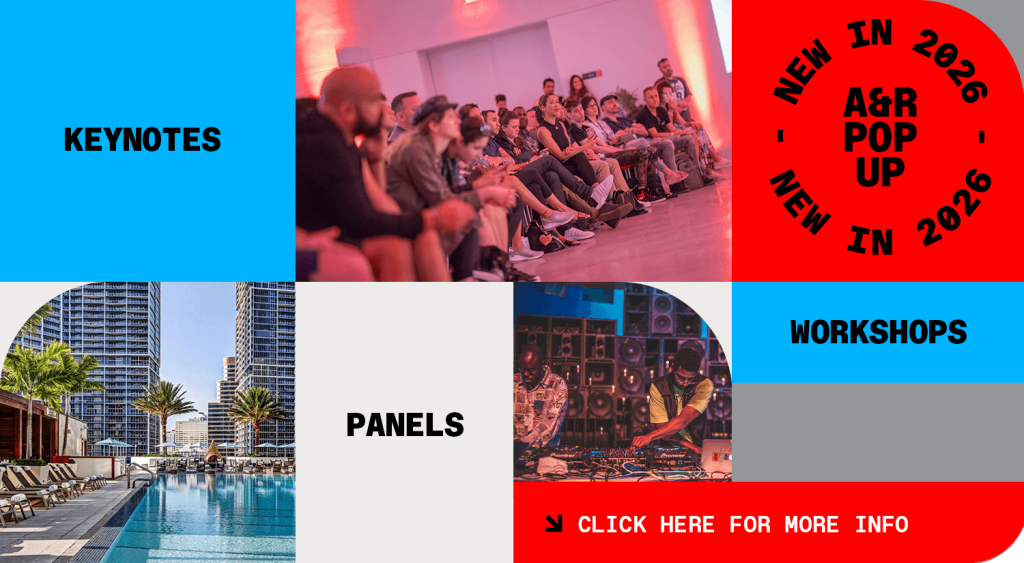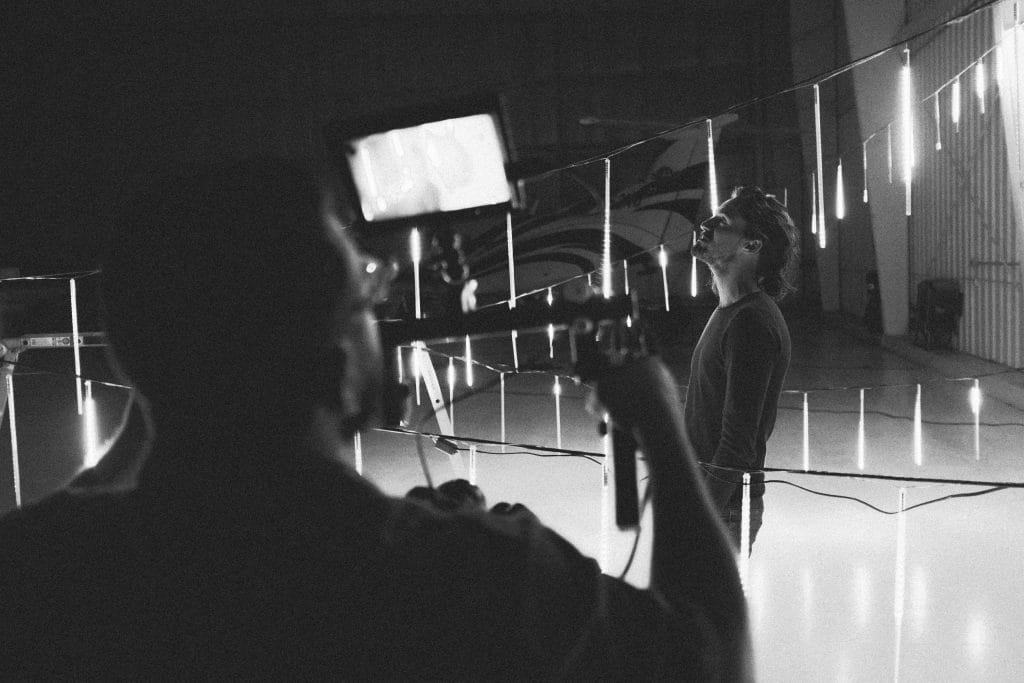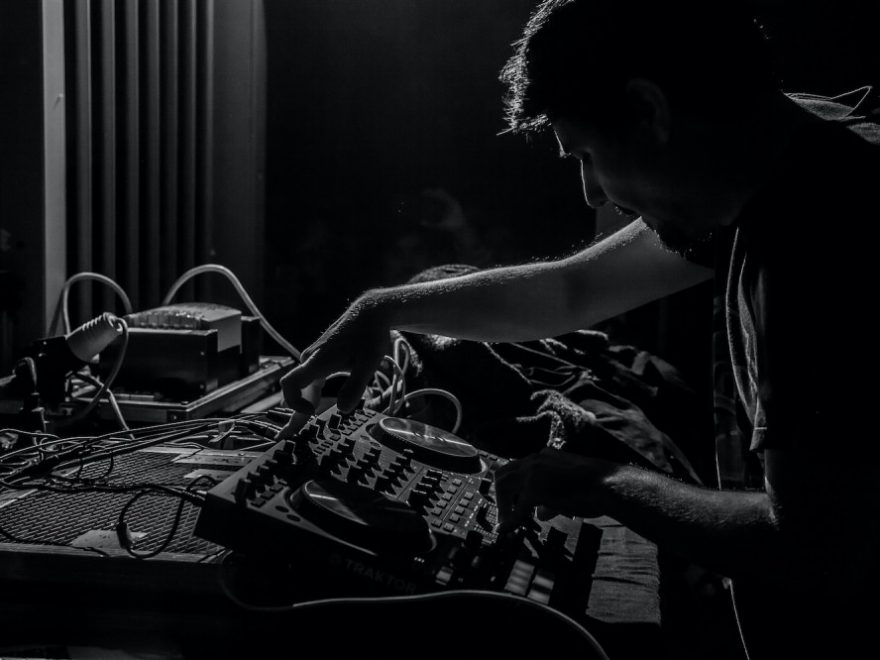Lauded as one of electronic’s defining visionaries of the recent generation, Amon Tobin‘s unearthing of the newest chapter in his long-standing career finds ground as another brilliant escapade. Surfacing years of precise preparation, Tobin returns to his bass alias Two Fingers for the project’s first album in over eight years, Fight! Fight! Fight!. The Brazilian-born aficionado’s latest output follows a return to the scene in 2019 with two fully-fleshed studio albums, after remaining on low-profile for several years after his heavily-lauded ISAM LP. While Tobin’s own music has erred on the side of experimentalism, Two Fingers is a total embracement of club-oriented bass extremity. His third full-length release is no different.
Fight! Fight! Fight! exudes the same idiosyncratic expression of boundary-pushing sound manipulation that has become synonymous with both Tobin and his drum ‘n’ bass moniker—only now, flocking with the new packaged goodness of reinvented executions. Ostentatiously on-the-fringe, the 11-track collection is an organically-intensive pursuit of sound design that resonates with the choirs of modern experimental bass. Sometimes rambunctious, sometimes wicked, the album ushers in a mischievous overtone, which paired with analog engineerings creates a learned underground vitality.
While presenting a potpourri of explorative soundscapes, Tobin crafts the listener’s entrance to the off-kilter world in well-paced introductions. Heavily jazzed with percussive centricity and effectively worn-in hip-hop samples, Fight! Fight! Fight! burgeons with rhythmic manipulations, indicative of half the track listing’s rampant titling use of the noun “rhythm.” In spite of its situationally-playable beat-oriented composition, for all that it’s given, the latest Two Fingers output is by no means an easily digested record—perhaps exactly as warranted by its creator.
Tobin continuously mines for anomalous aural creations, delivering permutations of hissing synths, masses of glitch, and ubiquitous bass in the exterior of individual songs. The eponymous leading track easily proves to be the audience-friendly starter of the pack—its bombastic barrage of vocal chops and pulsating production a sonic reproduction of a psychedelic cheerleader. However, the maelstrom that follows strikes hardly as palatable, but becomes more receivable with each listen. “You Ain’t Down” commences the pivot into sinister melodies, laying out loops that serve as the framework for Tobin to plug in his contortionist array of sounds. While portions of the album reveal its dependency on unconventional, hyper-randomized beat layouts, select tracks’ contain diversification in melodic variance that make for an incrementally more interesting product. Tobin’s collaborative expeditions with Ivy Lab, G Jones, and Little Snake serve as standout tracks in their distinct voices; “Razzy Beat” converses in dark funk-affecting waves, “Zero Face” receives synapse-firing chaos, and “Unknown Trauma” fires a technicolor explosion of pure noise. Although, the repetitive fleshing out of key ideas across various numbers causes their experimental essence to lose its novelty after consecutive glances, Fight! Fight! Fight! nonetheless persists as a challenging piece of work hidden with indulgent layers of careful conception and love for the eccentric possibilities of music.
Dancing Astronaut spoke to Tobin about his return as Two Fingers, navigating his newfound vehicle and label Nomark Records, and his intense devotion to music. Stream Fight! Fight! Fight! and read the full interview below.
Congratulations on the new Two Fingers LP Fight! Fight! Fight! This is your first Two Fingers full-length in eight years. How do you feel?
Ah, it’s nice to get it out. In a bit of a gestation period for a while and it’s been quite nerve wracking to hold them all in. Last year we started finally getting stuff out, working this whole time. So it’s been a really nice release actually.
You also had the streaming party yesterday for the album. How did that go?
Oh, it was so sweet. It was really nice that the collaborators on the record found time to do sets. I was meant to be in London that night and in France today, so we just thought it’d be at the very least nice to do a sort of a party, even though we can’t do the shows. I’m really glad we got to do it. It felt almost felt like doing a gig, cause it was a few of us on there, like all hanging out in the green room. We were talking to each other in between. It was nice.
Jumping onto the trends with the whole live streams.
Well what else can you do? Right? You could, you could just not do anything I guess. I mean it’d be nice to do shows that you actually see people at, maybe even get paid for. People are bored at home; this way they can at least see something.
Yeah, exactly. Do you have any plans to do another live stream soon?
I’ve never done anything like that so I wanted to see how this one would go. They’re quite labor intensive. At least for me, because when I put it together, I tend to attend to labor over it for a long time. I don’t want to just start, you know, streaming whatever bullshit I’m doing from my room. I would like it to be something that I’ve spent some time making and making it good. So I probably do less, but hopefully more formed things.
Two Fingers has been described as your vehicle for bass and club-driven avenues. Did you have any specific motivations driving you to create under this moniker once again?
Well, when it [Two Fingers] started, it was around 2006 or 2007. And it was born over a frustration that I couldn’t really put all of my interests under one banner. I mean, I’d been deejaying as a drum ‘n’ bass DJ since the late nineties. I’ve been around a while haha. A lot of the music I was into was really to make people dance, but as my own stuff just got weirder and more esoteric, less playable in a club, I found that all I could really do was separate those two things into their own camps. I could make things that were just fun to play at a club and then do my own shows as a personal, you know, presentation of an album. That’s how it started.
And it developed from there. Interestingly for me is that since then, I’ve discovered that I can do that with a number of different musical interests and create separate lanes for them. There’s a weird assumption that people make; they hear something you’ve done and they think, well, you’re done with the last thing. You’re not doing that anymore. Now you’re doing this. It doesn’t really work like that for me. I work on a range of different things in parallel. They all sort of develop gradually over time, but in their own lanes. That’s what I did now with Only Child Tyrant and later this year with Figueroa.
I want to talk a little bit more about that. Over the course of your 20+ year-career you’ve continuously morphed your artistic execution and your experimentation has only grown wider with time. If you had to choose one of your songs, which of them represents a complete embodiment of you as an artist?
Oh God, I don’t know. I really have no idea. So which book would you take to the island? I don’t know.
Would you say a big motivation behind founding Nomark Records was so that you could develop all these independent projects?
That’s exactly it. It would be quite unfair to expect to have a label with more artists than just me to do that. There’s so much of the music to release that it needed to make its own little pod, sort of an umbrella that could be a vehicle for that. I don’t even know if it’s fair to call it a label; it really as a vehicle. So all of these different projects, but who knows, right? Maybe if it goes well, it’s still very much in a learning phase. But if it does go well and these things become sort of sustainable, then I could start looking beyond my work and signing other artists and developing it into a proper label.
So each of these aliases are attached to a different musical sphere or interest that you want to further develop. And so could you elaborate a little bit more about where each of the interests first originated?
I guess they all come from a long time ago actually, but I sort of dip my toe into lots of these different places, just quite superficially over the years. So for example Only Child Tyrant, I’ve made back in the early two thousands or would actually way earlier than that. Like there’s a track called “Get Your Snack On” from Supermodified. That sounds a lot like Only Child Tyrant. It’s just developed more now. So things like that definitely were sort of the germs for these things, that kind of group.
Two Fingers is really personal, actually. Goes back to me being a kid. Hip hop was my first love. I was a scraggly B-boy when I was a teenager and Two Fingers harkens back to falling in love with my first genre of music. It’s meant to be almost like an ode to hip hop, but with drum ‘n’ bass production applied to it. It’s bass music. It’s wrapped in an idea of hip hop I developed when I was really quite young. You know, and onwards. I mean, these projects kind of seem to have some roots somewhere at some point in my life I guess. But I’m really lucky I get to explore them a bit deep, deeper now and see where they go.
Would you say like each of these aliases live as their own separate identity or they’re more just nuances of your main self that you’ve chosen to categorize by labeling them as such?
Well, you know, if it was up to me there would just be one name for all of them because they’re just different aspects of things that I’m into. So they’re all electronic as well. They’re all made with the same gear and often, they’re made at the same time. I’m not trying to confuse people too much. It’s more of a kind of that concession to the listener, I guess to just be fair and say, well look, you know, you’re gonna buy the next record under my own name and be mortified that it doesn’t sound anything like what you might have heard before from my name. I think it’s only fair if you’re going to start sharing, use it to try and label it more accurately so that people can at least have a chance of deciding whether or not they want to get into that.
In that same respect, you can also probably reach listeners by branching off under a different name as well.
Well that would be a slick marketing move. And I’m afraid I can’t take credit for it. I feel like unfortunately it probably works the other way a lot. I think the perception a lot of the time when you’re known for one thing and you do something else is that you’re dabbling. It’s not to be taken too seriously.
For instance, when I first released the Two Fingers record, I remember Pitchfork was quite scathing about me being this, sort of laughing at EDM and being like here, he comes taking the piss out of this genre. I mean, obviously there was an assumption, but you know, the reality is that these are really, really sincere pursuits for me. I fully endorse them. I’m fully behind each and every one of them. And that’s why it took so many years as well for me to start releasing them. I didn’t want to have a sketch, an idea, dabble of an idea, put it out and be like, what do you think of this? I wanted to develop it and really see if it held water, see if I could maintain it over time before I started sharing it with people.
Within that time period where you were just working on all this stuff and seeing how it would synergize and play out when you released it, how was your process like for that in terms of your day to day?
Kind of varied. There were some projects where everything took a back seat. Like I say, sometimes I’ll make things in parallel, but sometimes things eclipse everything else. Take Figueroa–that one involved getting drunk in the woods for quite a long time and that was the process for that record. So nothing else could really happen during that time. It really depends on the project. I think some are more collaborative and involve sharing the studio space with other people and some of them are quite isolated. Different processes for some of the different records.
The new Two Fingers project finds you collaborating with experimental luminaries like Ivy Lab and G Jones. As an experienced trailblazer, what mutual commonalities have you found with the newer talent? Differences?
Well I guess while I’ve been deejaying as Two Fingers, the DJ sets aren’t just Two Fingers—they’re things that have influenced Two Fingers and things that I’m listening to now. I was fortunate enough to be on the starting block for a few of these genres and add a modest contribution to the development. So it’s fascinating to me to see completely new generations of people do things that I certainly would never thought of. And then learn to incorporate in my sets.
I approached all these collaborators as a fan. To be honest, I was just a giant fan of Ivy lab for example. I really loved their music and I was playing their stuff in my sets all the time, I played G Jones in my set and I played Little Snake stuff in my set. I thought it would be kind of interesting to get this new generation of producers who I am a genuine fan of to then collaborate on tracks for the record. It all happened very naturally. It was based on mutual love.
Was there any prominent instrumentation or production techniques that you used on Fight! Fight! Fight!?
Previous Two Fingers records have been quite digital. They’ve been made a lot inside the box, I guess. I guess that’s interesting because I do hope that these different projects I’m doing inform each other and help develop each other and there’s a sort of cross pollen-ization that comes on. While I was making the Amon Tobin records from last year, it was my conscious decision to move outside of the box and to really enjoy them, enjoy the analog world a lot more and that fed into the Two Fingers productions too. So all of these tracks originate from boards to oscillators, whatever synthesizers from that are really based on computer software. It’s a less polished, less crispy sound, but has a rounder edge too, which I really like. Hopefully a bit more soul.
I have to ask, do you ever have a concept that goes behind the albums that ties into like a greater theme that you’re trying to portray?
I really don’t, you know I wish I could say I did. That would be quite impressive but, I actually don’t. I just feel my way through music on a more emotional level. It’s not really cerebral at all. What I do do is I have a pretty much a formed track in my mind at least musically. Then I try and approximate that as best I can while I make it, but that wouldn’t extend to an actual concept that reaches beyond just music, sound, melody and rhythm.
I really have to say, I just think music’s enough. You know what I mean? At least for me personally. I feel that there’s a great push, especially in the last ten years to have music be a part of something else. Like it must be a soundtrack to something or has to be accompanied by a visual or has to be something else that’s attached to it. I kind of go the other way. I’m really only interested in the music, so everything else is peripheral. I think there’s enough going on in the sound to satisfy at least me. I don’t really feel I need to attach even a visual to something let alone a concept most of the time.
That’s really beautiful. Especially in the current landscape, there’s always some ulterior intention behind the music or ways to market it.
Yeah and there’s people who are very good at that and I’m not one of them. I also am just not very interested in that, to be honest. I’m not even being judgmental about it. If I can do something in terms that I feel relevant to my own passions and interests, I can hope that there is some kind of connection from there to other people. But I wouldn’t know where to start in terms of how to present it or market it.
That’s interesting because I want to ask…you’ve done soundtracking and scoring. What’s your kind of process behind doing that?
Yeah, I actually haven’t done a lot of that work. I had a couple of that got picked up on, but I really haven’t done a lot of that. Because it is a bit of a struggle. When it works is when somebody comes to me and says, look this is a project or a film or something and I’d really like to hear what you could do for this. When it doesn’t work—which is why I haven’t been able to really enter that world—is when somebody approaches me and says, look, we need you to do this. And the nature of it to sound this way. Or there’s a whole committee of people.
I think I struggled with that. Again, I think the idea of having music be a job is really difficult for me. I’ve worked really hard for a long time not to have a job. The idea of kind of using music as a means to an end doesn’t really sit well.
You’ve mentioned that you prefer not to regard music with the intention of making it more “palatable” or adapted to business with the insight that “entertainment depends on the approval of others.” In regards to that statement, how do you see that reflecting in the current state of society, specifically the electronic music industry?
Oh man, that’s a big question. It goes to the root of a lot of things beyond music really. We might have slipped into a quite a cynical position where everything’s kind of treated as a stepping stone, where the objective is I guess just to be famous which is, again, it sounds really judgmental, but it’s just less interesting than having an interest in what you’re doing to begin with. I’m sure at a certain point things were really good and then because they were really good they were commodified.
But, somewhere along the line things kind of switched the other way around where it’s like, we have a product and now you have to make something so that the product will sell. You’re constantly trying to shift your interests to be more palatable, shift your objectives to be more relevant or culturally, you know, zeitgeisty or whatever it is that’s going to make it have a better chance of success, whatever that means. I think it underestimates people, a human people. I think people do eventually see through that. I saw it with the way live shows developed over the years very clearly too where you’d have something new and interesting happening and people would be fascinated by it, and then that thing would grow and grow and grow.
My ISAM show—it happened with that where we made this thing purely because I just didn’t know how to do a live show. I had to immerse myself in something worth watching. So we did this show and then it was like, okay, now it’s gotta to be bigger and bigger and that’s going to be bigger. And eventually I think people go to those shows and they just feel like, I’ve got no connection with the artist anymore. I’m just, I’m on a roller coaster ride in a theme park, what’s going on? And then they want to see somebody just playing a guitar in a living room, they want to feel something they’re not being marketed to. I do have a lot of faith in people’s own radar or people’s own desire to have an authentic experience.
Definitely. So how has spearheading Nomark records been playing out over the past year. This is your first record label, I’m assuming.
Yeah, yeah. And it’s terrifying. We had no shortage of releases; the release schedule this year, it’s full till next year, but it’s really like starting from scratch because nobody knows it exists to begin with. And, the landscape for letting people know things exist is really unfamiliar to me. I mean, fortunately I have a really lovely team of people that understand things like social media more than I could ever pretend to. They’re all in it for the love as well. Man. They’re behind it. And they’re dedicated and they’re trying to get the word out and come up with ideas like the Nomark Club, which is this thing we’ve tried to make. I mean, it’s [the label’s] still very much in debt, which is normal for a label our age, if you want to call it a label.
But yeah, it’s slowly reaching more people and where we’ve got things like that subscription really helps. It’s been great to do things like that and try them out and see if they work—it’s like they will be in this conversation with people where you sort of have to frame it that, you’re not really customers because we’re not providing a service. We’re doing whatever we’re doing and if you’re on board, that’s awesome. You know, that’s pretty much as far as it goes. But you can’t start saying, well I’d like this and I’d like that. I’m not happy with this. Because it’s like, no, there’s no customer service department here ’cause we’re not a fucking retail store. People are starting to get their heads around that and I think it’s starting to work, but it’s a real slow call for sure. And just trying to get funding for things like videos or God knows what and you know, content, I don’t know what the hell that means. And we’ll see where this goes.
It sounds like an exciting time, honestly.
At the very least, it really is that like I wake up every morning, like oh what’s happening today. So that’s kind of cool.
*This transcript has been edited slightly for clarity and readability
Featured Image: Gaëtan Tracqui






